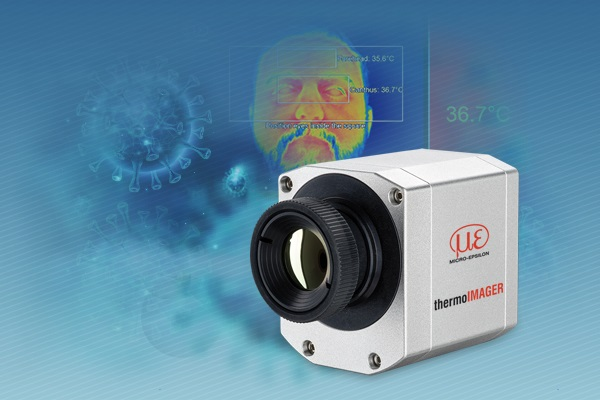Viral epidemics such as the current coronavirus (COVID-19) have created a global demand for infrared cameras that are able to screen for a fever condition in humans. Many businesses wish to protect their most important assets, their people, by installing appropriate fever screening systems. Micro-Epsilon has responded to this demand by introducing an infrared camera specifically for this application.
 Micro-Epsilon’s thermoIMAGER TIM QVGA-HD thermal imaging camera can be used for individual fever screening COVID-19 applications.
Micro-Epsilon’s thermoIMAGER TIM QVGA-HD thermal imaging camera can be used for individual fever screening COVID-19 applications.
The new thermoIMAGER TIM QVGA-HD-T100 infrared camera is supplied with a certificate of calibration that validates temperature measurements made against a traceable 35 °C temperature reference source (black body). The camera is accurate to ± 0.5 °C when used with the TM-BR20AR-TIM black body source, which means it can provide reliable skin temperature measurements for fever detection systems. It is ideal for integration into an automated monitoring system which can be used in real time at point-of-entry into establishments such as factories, offices, public buildings, warehouses, airports and schools, to prevent people with elevated body temperatures entering.
Glenn Wedgbrow, Business Development Manager at Micro-Epsilon UK comments: “The basis for the effectiveness of thermal cameras as a fever screening tool lies in the correlation of outside skin surface temperature with that of the internal or core body temperature. As a supplier of thermal imaging cameras, we are fielding many questions from existing and prospective customers with regards to their use as a screening tool for COVID-19. Although our cameras do not detect any specific virus or condition, they can be used to detect elevated body temperatures in humans, which may indicate a possible fever.”
Crowd-based screening
In crowd-based screening, an infrared camera monitors a crowd of people simultaneously or sequentially. Assuming that the majority of the measured maximum head temperature values are coming from healthy individuals, the exceptions with an elevated body temperature can be detected by the camera.
Individual screening
This method is primarily used at controlled entrances and security gates. The Medial Canthus (tear duct) provides the strongest correlation between outside skin temperature and core body temperature and is measured more precisely from a close distance. This method is also best for detecting low grade fevers. For this application, Micro-Epsilon recommends the thermoIMAGER TIM QVGA-HD-T100 infrared camera with 29° optics placed at a distance of 1m from the target, or the same camera but with 13° optics at a distance of 1.5 to 2 m from the target. To achieve an accuracy better than ± 0.5 °C the imager must be combined with the TM-BR20AR-TIM Black Body Reference Source.
Absolute temperature measurement accuracy
Most infrared cameras with 8-14 µm spectral response are specified with an accuracy of ± 2 °C or 2% of the reading, whichever is greater based on deployments in industrial environments in a wide variety of ambient conditions from 0 °C to +50 °C. This means that many thermal imagers are unable to achieve the accuracy required to detect a fever and so give false positive readings.
Many infrared cameras are being promoted today that claim to offer accuracies of ± 0.5 °C or better. However, these accuracies cannot be achieved without the use of a black body reference source. This source needs to be stable, have high emissivity and should be positioned in close proximity to the person to be scanned. It is vital to select a black body source with a very high stability, as not all black body sources are stable enough to provide a ± 0.5 °C system accuracy.
The TM-BR20AR-TIM ambient black body reference source from Micro-Epsilon can be combined with the thermoIMAGER TIM QVGA-HD-T100 camera. The black body is equipped with a 16-bit digital temperature sensor with ± 0.1 °C accuracy. By integrating this highly accurate reference signal to the TIM Connect software (freely provided with the camera), Micro-Epsilon can reduce camera uncertainties resulting from device adjustment, ambient temperature drift and short term stability down to a system accuracy of ± 0.5 °C with a confidence interval of 95%.
As Glenn Wedgbrow adds: “Our thermoIMAGER TIM QVGA-HD-T100 infrared camera combined with our TM-BR20AR-TIM black body reference source provides a highly accurate, reliable non-contact body temperature measurement system that meets the accuracy requirement of EC 80601-2-59:2017 for human fever detection using infrared temperature measurement.”